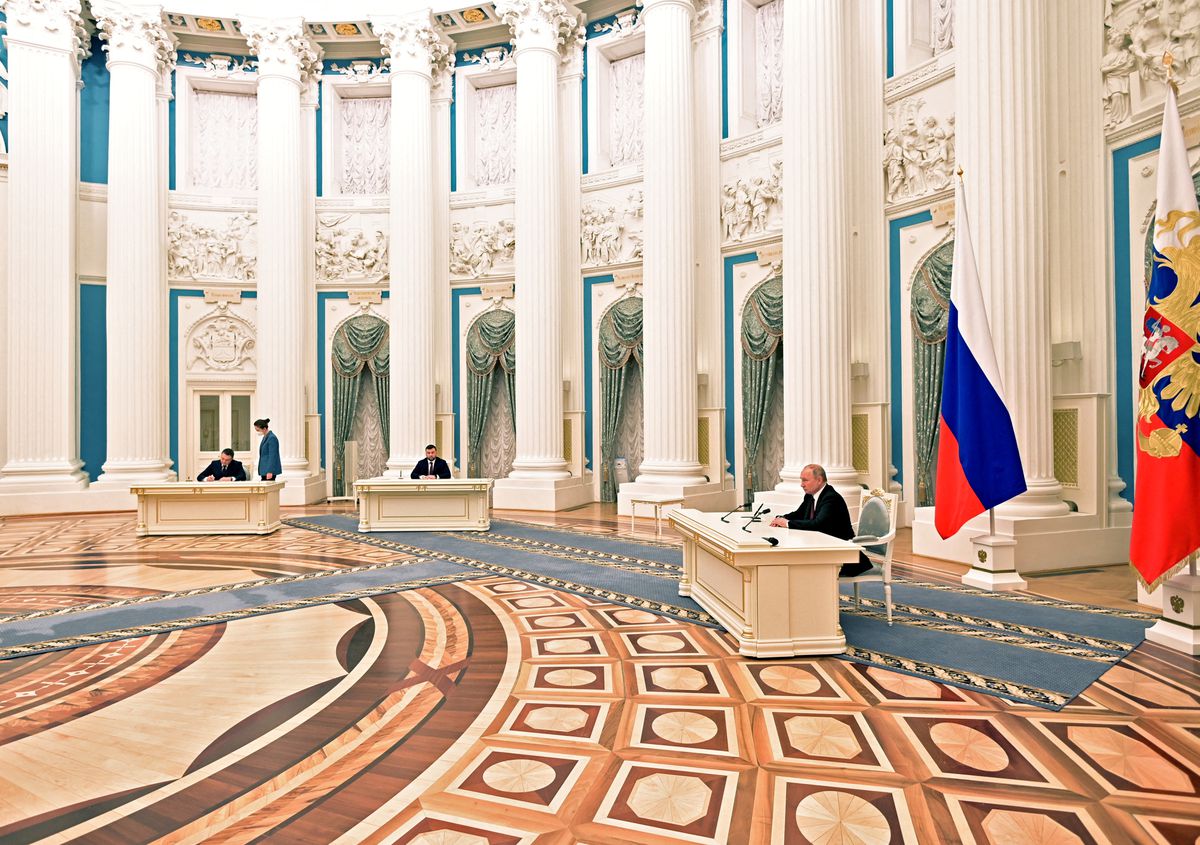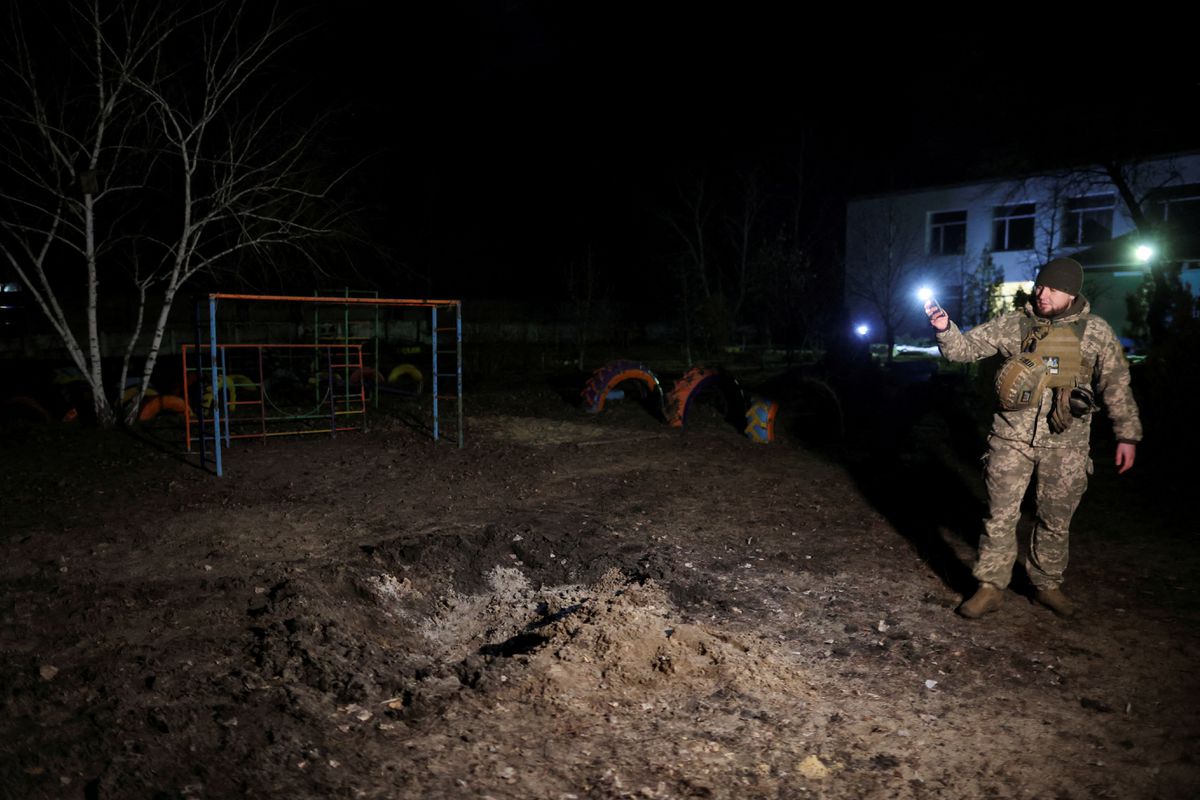Russian President Vladimir Putin recognized two breakaway regions in eastern Ukraine as independent on Monday and ordered the Russian army to launch what Moscow called a peacekeeping operation into the area, accelerating a crisis the West fears could unleash a major war.
Putin told Russia’s defense ministry to deploy troops into the two regions to “keep the peace” in a decree issued shortly after announcing recognition for Russian-backed separatists there, drawing U.S. and European condemnation and vows of new sanctions.
It was not immediately clear whether the Russian military action would be regarded by the West as the start of an invasion of Ukraine that the United States and its allies have warned about for weeks since the area was already controlled by Russian-backed separatists and Moscow in practice.
There was no word on the size of the force Putin was dispatching, but the decree said Russia now had the right to build military bases in the breakaway regions and that troops’ mission would be to uphold the peace.
In a lengthy televised address packed with grievances against the West, Putin, looking visibly angry, described Ukraine as an integral part of Russia’s history and said eastern Ukraine was ancient Russian lands and that he was confident the Russian people would support his decision.
Russian state television showed Putin, joined by Russia-backed separatist leaders, signing a decree recognizing the independence of the two Ukrainian breakaway regions — the self-proclaimed Donetsk People’s Republic and the Lugansk People’s Republic – along with agreements on cooperation and friendship.
Defying Western warnings against such a move, Putin had announced his decision in phone calls to the leaders of Germany and France earlier, both of whom voiced disappointment, the Kremlin said.
 |
|
Russian President Vladimir Putin attends a ceremony to sign documents, including a decree recognizing two Russian-backed breakaway regions in eastern Ukraine as independent entities, with leaders of the self-proclaimed republics Leonid Pasechnik and Denis Pushilin seen in the background, in Moscow, Russia, in this picture released February 21, 2022. Photo handed out via Reuters |
Moscow’s action may well torpedo a last-minute bid for a summit with U.S. President Joe Biden to prevent Russia from invading Ukraine. The rouble extended its losses as Putin spoke, at one point sliding beyond 80 per dollar.
Biden will issue an executive order soon prohibiting “new investment, trade, and financing by U.S. persons to, from, or in” the two breakaway regions, the White House said. It will “also provide authority to impose sanctions on any person determined to operate in those areas of Ukraine,” White House spokesperson Jen Psaki said in a statement.
Psaki said measures being rolled out in response to Putin’s decree were separate from sanctions the United States and its allies have been readying if Russia invades Ukraine.
U.S. Secretary of State Antony Blinken said the executive order “is designed to prevent Russia from profiting off of this blatant violation of international law.”
The U.N. Security Council will meet publicly on Ukraine at 9 p.m. EST Monday (0200 GMT on Tuesday), a Russian diplomat said, following a request by the United States, the United Kingdom and France.
Dutch Prime Minister Mark Rutte said European Union countries have agreed to impose a limited set of sanctions “targeting those who are responsible” for Russia’s recognition of the rebel regions.
British foreign minister Liz Truss said in a Twitter post that on Tuesday the government will announce new sanctions on Russia in response to Putin’s decision.
NATO Secretary-General Jens Stoltenberg accused Russia of continuing to fuel the conflict in eastern Ukraine and “trying to stage a pretext” for a further invasion. Russia annexed Crimea from Ukraine in 2014.
In his address, Putin delved into history as far back as the Ottoman empire and as recent as the tensions over NATO’s eastward expansion – a major irritant for Moscow in the present crisis.
With his decision, Putin brushed off Western warnings that such a step would be illegal, kill off peace negotiations and trigger sanctions.
“I deem it necessary to make a decision that should have been made a long time ago – to immediately recognize the independence and sovereignty of the Donetsk People’s Republic and the Lugansk People’s Republic,” Putin said.
He said earlier that “if Ukraine was to join NATO it would serve as a direct threat to the security of Russia.”
 |
|
A Ukrainian soldier stands at a playground outside a kindergarten, which according to Ukraine’s military officials was damaged by shelling, in Stanytsia Luhanska, in the Luhansk region, Ukraine, February 17, 2022. Photo by Reuters/Carlos Barria |
Sanctions threat
Putin has for years worked to restore Russia’s influence over nations that emerged after the collapse of the Soviet Union, with Ukraine holding an important place in his ambitions.
Russia denies any plan to attack its neighbor, but it has threatened unspecified “military-technical” action unless it receives sweeping security guarantees, including a promise that Ukraine will never join NATO.
But recognition of the separatist-held areas paved the way for Putin to send military forces there, arguing that he was intervening as an ally to protect the separatists against Ukrainian forces.
Putin’s move will narrow the diplomatic options to avoid war, since it is an explicit rejection of a seven-year-old ceasefire mediated by France and Germany, touted as the framework for future negotiations on the wider crisis.
Separately, Moscow said Ukrainian military saboteurs had tried to enter Russian territory in armed vehicles leading to five deaths, an accusation dismissed as “fake news” by Kyiv.
Both developments fit a pattern repeatedly predicted by Western governments, who accuse Russia of preparing to fabricate a pretext to invade by blaming Kyiv for attacks and relying on pleas for help from separatist proxies.
Moscow has said repeatedly it has no such plans.
Hours earlier, French President Emmanuel Macron gave hope of a diplomatic solution, saying Putin and Biden had agreed in principle to meet.
But the Kremlin said there were no specific plans for a summit. The White House said Biden had accepted the meeting “in principle” but only “if an invasion hasn’t happened”.
Washington says Russia has massed a force numbering 169,000-190,000 troops in the region, including the separatists in the breakaway regions, and could invade within days.
European financial markets tumbled at the signs of increased confrontation, after having briefly edged higher on the glimmer of hope that a summit might offer a path out of Europe’s biggest military crisis in decades. The price of oil – Russia’s main export – rose, while Russian shares and the rouble plunged.
- Reduce Hair Loss with PURA D’OR Gold Label Shampoo
- Castor Oil Has Made a “Huge” Difference With Hair and Brow Growth
- Excessive hair loss in men: Signs of illness that cannot be subjective
- Dịch Vụ SEO Website ở Los Angeles, CA: đưa trang web doanh nghiệp bạn lên top Google
- Nails Salon Sierra Madre
 VnExpress News The News Gateway of Vietnam
VnExpress News The News Gateway of Vietnam





